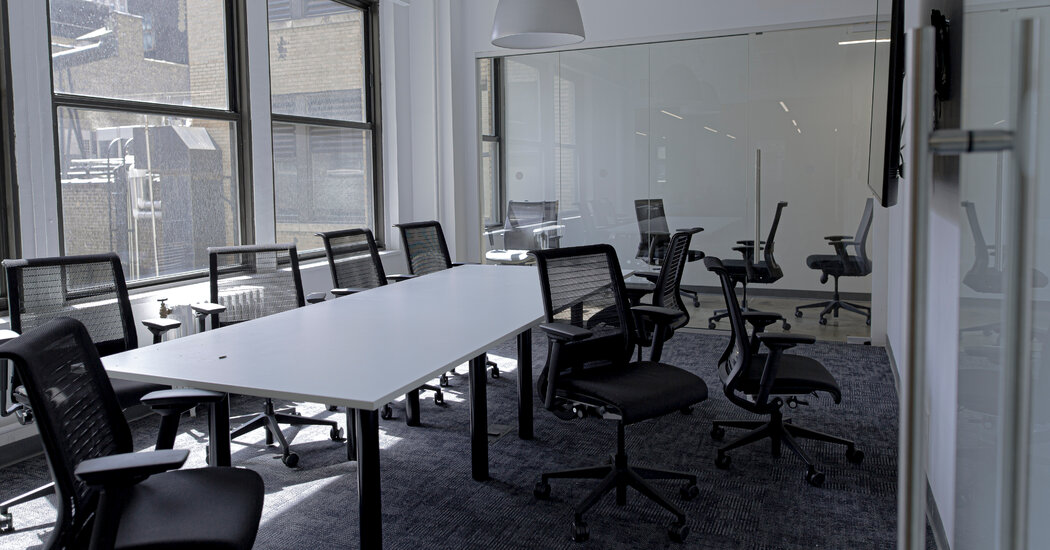This is the real reason for companies wanting people back to the office.
All this talk about collaboration and team spirit is just the publicly given reason for wanting people back to the office.
The real reason is that now the owners of the buildings are losing money.
Cry me a river.
Yep, been saying this for years now, the vicious and irrational hatred against work from home employees is driven by two main factors:
-
At a systemic level, despite work from home being obviously less costly in the long run than maintaining an office space, if work from home were allowed to proliferate it basically pop the commercial real estate bubble and then basically every corrupt mayor and idiots in upper management would be shown to be corrupt idiots.
-
At a more personal level, upper and middle management people essentially get their kicks from seeing busy little worker bees near them, and they would personally have existential crisis when they realize that 90% of what they do is negging and then ommitting or misrepresenting that in actual meetings. Actual meetings which can easily take place in zoom, or often replaced with just an email.
Another part of #2 is they can no longer be toxic and verbally abusive, like they could in person. Anything virtual might be recorded and every email is a record.
Thats a key element as well, the insane corpo manipulation that only exists if you can prove it even though everyone who doesnt up their head up either their own ass or someone elses knows is absurdly rampant… but youre too busy to record it all!
And you can’t sleep with employees who work from home.
I count my wife as my secretary every now and then, does that count? ( ͡° ͜ʖ ͡°)
She’s already signed an agreement that supersedes HR policy on the pen in company ink: A marriage license
Except family business in alabama
-
This is the best summary I could come up with:
Employees sent to work from home at the start of the pandemic have not fully returned, a situation that, combined with high interest rates, is wiping out value in a major class of commercial real estate.
The past week brought a taste of the brewing problems when New York Community Bank’s stock plunged after the lender disclosed unexpected losses on real estate loans tied to both office and apartment buildings.
When a string of banks failed last spring — partly because of rising interest rates that had reduced the value of their assets — analysts fretted that commercial real estate could trigger a wider set of problems.
In other cases, banks are using short-term extensions rather than taking over struggling buildings or renewing now-unworkable leases — hoping that interest rates will come down, which would help lift property values, and that workers will return.
The value of bank assets has taken a beating amid higher Fed rates, Mr. Piskorski and Ms. Jiang found in their paper, which means that mounting commercial real estate losses could leave many institutions in bad shape.
“Commercial real estate is an area that we’ve long been aware could create financial stability risks or losses in the banking system, and this is something that requires careful supervisory attention,” Treasury Secretary Janet L. Yellen said during congressional testimony this week.
The original article contains 1,246 words, the summary contains 223 words. Saved 82%. I’m a bot and I’m open source!
Oh no.
Anyway.
I live in New York. The Wall Street area has been turning older buildings into living spaces for a while. One old office building became an NYU dorm, and the Woolworth Building [once the tallest in the world] is now luxury condos.
And you know what’s nice about doing that? It’s people present 24/7 and that means stores and restaurants that can be open even past office hours!
It’s funny because back in the day, you could go down to Wall Street on a Sunday and have the whole place to yourself. Today, there are lots of bars and restaurants and groceries.
The only time I went was about 8 years ago on a Thursday evening and the place was dead, a few people that worked late and were going home, a few tourists here and there and that’s it…
I was visiting a friend down there and walked back to my hotel at 2am. Literally the only people out were a bunch of cops standing around empty street corners.
So, you’re surprised that people with nice apartments full of goodies aren’t hanging out on street corners?
It’s sad that problems for banks are never problems only for banks. They always turn into problems for everybody else
Damn, squatting on real estate is backfiring. I’m heartbroken
I will never have sympathy for landlords.
Easiest ‘job’ on the planet.
I had to start going back to the office today. I’ll eventually split time between two buildings, but my main office is practically empty. Been here 3 days in a row, and I’m the only one in my area that stayed the entire day. The first day 4 of 5 other people left at lunch. The last person left about 4:15pm.
Yestersay I was by myself until about 10am and that person left at 4. I’m here by myself today and I don’t suspect anyone will show up late.
On the other side of the floor where the breakroom is, there’s maybe been 7 people total across the 3 days I’ve been here lol.
Yeah it’s like that now. People come in late and leave early. I do that too since it’s fine. Only one office day is required and I make sure to come in late and leave early to beat traffic. Everyone does. :)
I use it as a day of socializing with the team. Just talking. Not much work.
For me, it’s important as a mental health thing. Working from home, I tend not to see other humans and not go anywhere I don’t need to. I’m also poor at establishing work-life boundaries.
Meanwhile, going into work means getting presentable, interacting with people, not forgetting a lunch break, and I tend to stop working when the place empties out.
It’s also important for career advancement. I’m poor at self-promotion, so working from home is “out of sight, out of mind” no matter how much I do. It’s easy to say that management needs to figure that out, but it’s in my self-interest to make sure they realize when I get shit done
deleted by creator
Yeah, I get the socializing aspect and it hasn’t been bad coming in. I’ve been wfh for the past like 4 years so it’s nice to put on actual clothes instead of wearing joggers and t-shirts every day lol. You’re lucky you’re only required to come in one day a week. We have to come in 3 days (eventually we’ll be monitored to make sure we come in 3 days) but at least we can pick the 3 days every week.
On the plus side, we have assigned cubes (no hotel cubes thankfully!) and since I was part of the first small group to come in, I was able to change cubes.
However, I still think it’s BS that companies are forcing the back to work crap with such strict boundaries.
I know, I got very lucky with just one day in the office. And that is so important to me that I don’t even consider looking at other jobs right now. I will stay here for at least another year, probably even longer. Just because of that super nice single office day per week.
Every other job ad I see have “50% in office”.
lol I wrote this over a year ago
I’m a union commercial electrician where I spent a decade building and improving tenant spaces in commercial towers in Seattle and Bellevue. There’s a huge dip in our work now that there aren’t high rises being occupied. I’d like people to work from home, but my blue collar job can’t be done from home. If we can change what these buildings are used for I wouldn’t be worried.
Google here in Fremont area on the other hand is expanding their space by occupying a larger foot print with a smaller work force per square foot. That’s a good way to keep us working.
I don’t know anything about being an electrician - commercial or otherwise, so I’m curious to hear your side.
When all those people go to working remote, it’s not like they’re no longer in need of electricity. Presumably their home demand is higher and we might even see people adding new office spaces to adapt their home. Maybe the public grid needs to change to support it? Won’t this mean that there will just be a different type of demand for electricians?
Are there reasons this would be less attractive to electricians? Pay, job security, or something else?
There are many different types of electrical workers. I’m a commercial inside wireman. I’m licensed to install electrical infrastructure and maintain electrical infrastructure in commercial and industrial complexes. I have a wide range of work I can do, but to put it simply I only have a job if: Complexes are being built (I’m doing construction) Complexes are being used (this is mostly industrial since commercial spaces have building engineers that mostly took over our maintaince work).
People working from home eliminate both my outlets of work. Residential electricians make significantly less than I do, and their work is pretty similar but dedicated to homes. But even their work would be cut because if we’re talking office employees making an office at home, there’s not much if anything required of any electrician for someone to set up a computer and a desk in their home. The grid will be using much less power due to drop in facilities.
But it’s not just my job as an electrician. It’s construction in the city as a whole and even the city economy. Because outside of the residential district in cities, people working from home in the suburbs aren’t utilizing the city infrastructure and commercial goods.
Fremont in Seattle has a large presence with many employees. The tech here tries to stay very competitive so Google was providing their employees with beautiful breakfast and lunch amenities. This created such a blow to Fremonts local restaurants that Seattle had to implement a special tax for serving food in your complex. Basically food cannot be free.
This is but one industry being impacted with employees no longer having a presence in the city high rises they’re employed at. Construction slowing or being fully eliminated will remove our presence in the city, majority of tradesmen. Tech will invest less because employees will take care of their own facilities by working from home. Now the economy takes a hit, we don’t have work in the city, restaurants don’t have customers, and the jobs of the office workers are suddenly finding themselves not needed as much either. Now residential high rises in the city are being vacated. The towers are losing employees and residents. The city stagnants. Economy crashes.
Of course this is pretty dramatic, and very generalized. But people working from home effects A LOT including a few steps down, their own careers.
So more or less, since many businesses are only keeping their offices because they have multi-year leases preventing them from simply packing up and going fully remote or downsizing to a smaller office, we can expect occupancy rates to continue falling and slow-burn exacerbating the commercial real estate crisis. And really, the problem here is just that banks are overinvested in commercial real estate, not knowing that a pandemic would alter work patterns in a lasting way. So again, we’re all in for a fun ride on the roller coaster that is capitalism, literally because of problems caused by real estate speculation.
Because banks fucked up and we have to solve it
Meanwhile my company wants to double or even triple the amount of office space we lease in the next 2-3 years, but building management is quoting us prices that are even slightly higher than they were in 2020.
Kinda sounds like the board of your company is full of real estate developers who still win if you guys go tits up.
Prices only go up. If a price is allowed to fall then the gravy train stops and the owner class gets really salty.
If they can’t afford to lose money, they should stop being poor.
It’s really not that hard.
They should sell the buildings…
But nobody wants those buildings.
They do, just not at the prices they want to sell them at.
So, I’ve thought about it and we have a housing shortage and an excess of offices. Seems like a solid solution. Takes a lot of work to make an office into a home, but it’s more profitable than leaving them empty.
But no, that would help people, and the cruelty is the point.
Yep, Ive been saying this for years now as well.
We have giant mostly empty office buildings which could be converted into mostly apartments, with even make shift permitted commercial zones for basically street vendor / convention booth style shops every 10 floors.
Instead it apparently makes more sense to not do this because it makes more sense to keep them empty, heated and lit 24/7, as basically a way to prop up the retail property market.
Capitalism is a farce, and it has already doomed us all: we have now breached the 1.5 C warming barrier, even more rapidly than most of the worst case scenarios predicted. Permafrost in Siberia and Northern Canada is already thawing and releasing methane.
Enjoy the collapse of human civilization in your own lifetime as people and governments continue to squabble and combat each other over scarcer and scarcer resources as our entire way of life becomes too expensive to maintain.
deleted by creator
This is true, there are hurdles and there people actively working to overcome them and succeeding.
Would you like to know more? https://duckduckgo.com/?q=office+to+residential
deleted by creator
It’s a solid solution only if someone ponies up the money to pay for the incredible effort it takes to convert an office building into residences. Waving your hands in the air and telling someone else to pay for it is not a good argument.
Are you watching me? How did you know I was waving my hands in the air?
They should stop buying avocado toast and make their coffee at home!
Skill issue
That doesn’t make sense. The companies that want people to come back to the office are the ones paying rent. That rent doesn’t get better or worse if people come back to the office.
Yes, thank you! I hate this constant narrative that back-to-office is always tied to commercial real-estate investments, or that there’s some magical tax incentive.
Usually what you have is: bank lends money to a commercial real estate company that owns the building. Commercial real estate company leases out office space to one or many companies. When those companies reduce or terminate their leases, the commercial real estate company struggles to pay their mortgage and defaults. Commercial real estate loses. Bank loses. And if commercial real estate had pooled investments to fund the building (along with bank loan), then those investors lose as well.
There are some large companies that own their own buildings, but that’s more of an exception.
And the companies are controlled by venture capitalists, who are smart and distribute their investments. So they have interests in various companies, including the real estate companies.
But those rent paying companies have very wealthy boards who are invested in commercial real estate.
These companies tend to own or have long term leases, so either they are stuck paying rent and have to justify the expense or they own an asset that is depreciating in value and they could stop that from happening by spending no money to force their employees back into the office. You have to think about the big money, too. Real estate is a cornerstone asset for big money, many banks and real estate empires hold these enormous office buildings and society trending towards WFH means those buildings are rapidly losing their value.
Justifying the rental expense doesn’t really make sense, because they end up paying more in utilities in addition to the rent. If you’re still on the hook for a lease and have most employees WFH, just downsize when the lease ends or move everything remote if possible.
Seems like banks are worried about the loan holders defaulting and are pushing companies to bring employees back to bring up demand for commercial real estate?
these leases are like 10 to 30 years, its not like a yearly one.
Why would anybody get into an unbreakable office lease of 10 years? Let alone 30.
You have never leased out a office building I can see. If you area going to spend 100,000’s even into more to make the office space (as you build to suit inside the space as well) you wanna know you have it for so long. So it was good for biz as they knew they would have it for a decade maybe more and protect the investment. And it would also lock in the rent rates for that time so they could stave off inflating rents (there is a normally a year over year % increases built into the lease so the company that owns the building doesnt loose out too bad).
It was also something that C levels were spending their money on, they would own the property company and get even more out of it. They could spend a ton with a bank with the thought of I can assure you biz X (which they are on the board of if not the CEO outright) will be there for this many years and will pay the principal of the loan over this time, we also built space for other offices inside the building and we will give a discount to anyone that used or is referred by your bank. Again stacking security onto the loan they got, plus more to put on a plate of a potential biz start up.
I’m aware, but that doesn’t negate my point. The tenant company still has to pay more in utilities and such to bring people back to the office. Whether they pay that cost for 10, 20, however many years is extraneous.
A lot of larger citys will also have things on the books (not sure if it will effect commercial zoned buildings) but if they are empty they will be charged much higher tax rates. And also if you turn on the lights in a place its normally the whole area is turned on. So if they get 3 people to come in they are spending the same power that a full office would need (assuming they have workstations there) if not then they need to wait till the contract they have allows for some sort not full payout with other penalties (which when you see a biz go under the lease holder will be part of the creditors that get money well before employees).
If only there was some solution to unused corporate office space and the housing crisis that has tents in every city?!?
Oh well. Better give the bank a bailout and stop thinking about it.
Wait…are you suggesting we solve a problem? Or even two problems simultaneously? That’s absurd! We need tax cuts, deregulation, and corporate bailouts…I may not know the problem, but I know the solution. /s




















